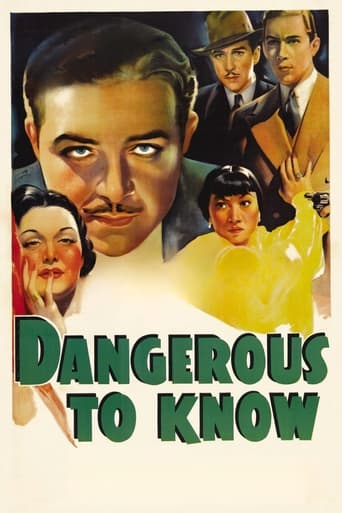JohnHowardReid
I had high expectations for Dangerous To Know (released 11 March 1938). With a screenplay co-written by Horace McCoy, based on an Edgar Wallace play, and directed by the usually reliable Robert Florey, I anticipated a real treat. Unfortunately, the writers have obviously built up the central role, here played by hammily over-accented Akim Tamiroff. Worse still, Florey has chosen to set this "B" movie up as a TV drama, persistently using a staggering number of close-ups to little effect. A close-up is even squandered on Hedda Hopper, would you believe? This procedure would be more tolerable if Ted Sparkuhl's photography shone with velvety noir lighting. Alas, Sparkuhl supplies little atmosphere and doesn't flatter the players at all. Villainous Akim Tamiroff doesn't look like a ruthless gangster so much as a comically dwarfish little man with an expensive but highly incompetent tailor, while the normally super-exotic Miss Wong appears as neither a sinuous nor beautiful siren, but is presented rather as if she were portraying a bland, moderately articulate, but disinterested dress-shop manageress in a second-class neighborhood. The only player to emerge with any real credit from this premature TV drama is Tamiroff's chief henchman, Anthony Quinn (whose part is fortunately much larger than his bottom-of-the-bill credit might indicate). Quinn at least bristles with a reasonable amount of charisma, but still manages the difficult feat of portraying a savvy lieutenant whom the script requires to be both cunningly useful yet on the dumb side of bright.
a666333
This is about as good as a one hour B movie can get. While coming from the series of Paramount's Anna May Wong vehicles made in the late 30s, it rises above the straight formula nature of the vast majority of B movies with strong acting, various aspects of the art direction, and a final scene that is genuinely suspenseful. As usual, Wong visually dominates her scenes. The directing and editing play on that to the hilt.For those into the subtle art of references slipped into the background, symbolism, use of numbers, etc, there is a lot to look for and see in this movie.
rsoonsa
Director Robert Florey, who studied under Feuillade and served beneath Sternberg and Vidor among others, is at his best in this dark work by one of the most innovative "B" film auteurs, completed during his strongest period at Paramount, a tastefully crafted film replete with Florey's trademarked strengths: crisp pacing, a realistic spirit, and creative employment of expressionistic composition through camera and lighting that establishes humours for each scene. A student of cinema in all of its artistic aspects, Florey showcases to telling effect in this affair the performing ability of classically trained Akim Tamiroff, who gives his finest performance, and of Anna May Wong, who benefits from the director's use of closeups as she fills a part that she created for her stage debut in "On the Spot", by Edgar Wallace, upon which the screenplay is based. Florey's enthusiasm for Asian art, costume, and other elements of design is in evidence throughout a film that reportedly receives little or no circulation through the medium of television, with but a single public domain archive for availability, unfortunate for cineastes since there is great worth to be found within the piece, the director's endeavours augmented well by the editing of Arthur Schmidt and creative cinematography, essentially by Karl Struss. The setting is in Los Angeles, where gangster Steve Recka (Tamiroff) dominates the workings of city politics without achieving that which he most craves: acceptance into the world of old money that of course can never look with favour upon such a man, notwithstanding his powerful influence. Scorning his loyal mistress, Lan Ying (Wong), Recka courts Margaret Van Case (Gail Patrick) as a method of scaling the societal ridge that daunts him, thereby generating in Lan Ying a desire for revenge, leading to an insightful scene of suspense that Florey swashes with melodramatic cunning. A solid supporting cast is in place, led by Lloyd Nolan's portrayal of a detective lieutenant who avidly seeks an arrest of Recka for his crimes, and by Anthony Quinn as Recka's principal henchman, and when requirements of the film's "B" nature come to the fore in the script, the players avoid condescension with their readings, yet another component of Florey's artistry.


